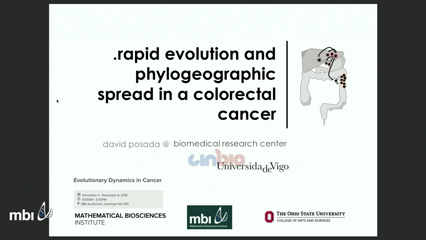MBI Videos
David Posada
-
 David PosadaHow and when tumoral clones start spreading to surrounding and distant tissues is currently unclear. Here, we applied a sophisticated evolutionary framework to describe the evolutionary history of a colorectal cancer in time and space. In particular, we have leveraged state-of-the-art approaches from statistical phylogenetics, phylodynamics, and biogeography that allowed us to date the origin of the tumor, to quantify its demography, and to identify the different colonization events that took place. Thus, our analyses strongly support an early monoclonal metastatic colonization, followed by a rapid population expansion at both primary and secondary sites. Moreover, we infer a hematogenous metastatic spread seemingly under positive selection, plus the return of some tumoral cells from the liver back to the colon lymph nodes. This study provides unprecedented detail a picture of the tempo and mode of the tumoral clonal dynamics within a single patient. Importantly, it exemplifies how sound methods from organismal evolutionary biology can be ported to the within-individual level in order to understand complex tumoral dynamics over time and space.
David PosadaHow and when tumoral clones start spreading to surrounding and distant tissues is currently unclear. Here, we applied a sophisticated evolutionary framework to describe the evolutionary history of a colorectal cancer in time and space. In particular, we have leveraged state-of-the-art approaches from statistical phylogenetics, phylodynamics, and biogeography that allowed us to date the origin of the tumor, to quantify its demography, and to identify the different colonization events that took place. Thus, our analyses strongly support an early monoclonal metastatic colonization, followed by a rapid population expansion at both primary and secondary sites. Moreover, we infer a hematogenous metastatic spread seemingly under positive selection, plus the return of some tumoral cells from the liver back to the colon lymph nodes. This study provides unprecedented detail a picture of the tempo and mode of the tumoral clonal dynamics within a single patient. Importantly, it exemplifies how sound methods from organismal evolutionary biology can be ported to the within-individual level in order to understand complex tumoral dynamics over time and space.
